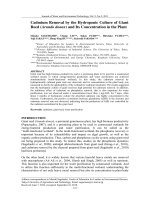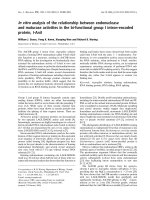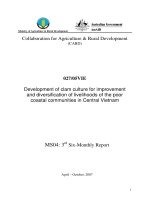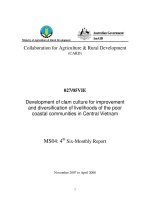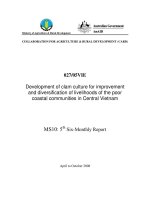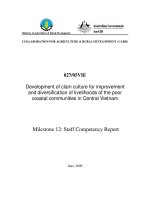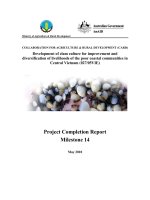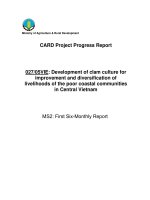Sumary: The difference of the culture between Vietnam and US (lesson in the university)
Bạn đang xem bản rút gọn của tài liệu. Xem và tải ngay bản đầy đủ của tài liệu tại đây (141.46 KB, 11 trang )
Page 1
Getting Along with People
1.
Introduction
The person smile when introducing himself or her self. The handshake like firm and gently.
They just shake hands some seconds. The other person looks at your eyes when speaking.
It is an arm a far from you to the other person in conversation.
US
the Either the person who wishes to meet another or
a friend who knows the other person makes the
introductions.
Who
should
be A younger person should be introduced to an
introduced to whom?
older person, a subordinate to a subordinate to a
superior.
What should you say?
“Hello, my name is___”
“Mary Jane, I’d like you to meet my friend,
John Jones.”
“Dr. Raman, this is my associate, Pro Allen”
May a man introduce Yes; yes
himself to a woman?
May a woman introduce
herself
To a man?
What body language Smile, face the person, and look attentively at
(facial
expressions, the person’s eyes.
gestures)
should
a
person use?
Who
makes
introduction?
What tone of
should you use?
voice
Does a person shake
hands when meeting
someone?
How should you shake
hands? (*)
Do people embrace or
kiss people of the same
sex upon meeting?
Do you kiss or hug
children when they are
introduced?
VN
Same
Introduce the friend first
When greeting someone,
say “xin chao” +given
name + title.
Same
shaking hands both when
greeting and when saying
good-bye
bowing the head
waving hand
Use a quite but friendly tone.
It depends on the area.
Example:
in
the
countryside is loud. In
the city (company) is
friendly tone.
Men and woman usually shake hands firmly Men shaking hand with
and gently.
the other. A man want to
shake hands with the
woman, he must ask he
permission.
No, unless the people are very close friends. Touching children on the
Men kiss each other if they are relatives or very head is only done by
close friends.
parents,
grandparents,
etc.
Not usually.
Page 2
Some good things to talk about with your new friend include the following:
1. The country you or the other person is from
- What is it like?
- How does it compare to US or Vietnam?
2. What the other person is studying or has studies in school
- What are you studying in school?
- What is your favourite subject?
- What do you want to do after you graduate?
3. The work that the other person does
- What kind of work do you do?
- Do you like it?
- What do you enjoy about it?
- How did you decide to go into teaching, programming,…)
4. North America
- What do you like about the US/ Canada?
- What interesting things have happened since you came here?
5. Your family
6. Current events
7. The weather
Some subjects that you should not talk about, especially with someone you don’t know well.
1. How much money you have or make
- How much money do you earn?
2. How much someone paid for something
- How much does it cost?
- How much
3. Sexual subject
4. Class, status or racial issues
5. A person’s age
- How old are you?
- What’s your age?
6. A person’s weight
- How heavy are you?
7. Politics
8. Religion
9. Distance & Space Requirements
Riding on a bus with people you don’t know
Waiting in a doctor’s office
Waiting in line
Eating lunch in a restaurant or café
Talking to your boss or teacher
Talking to friends in a group
Talking to a stranger
One seat apart
2 feet apart
1 seat apart
3 – 4 feet apart
2 – 3 feet apart
3 – 4 feet apart
Page 3
Talking to a child
3 – 4 feet apart
Page 4
Attending school
School rule
VIET NAM
1. Don’t paint your fingernails/ don’t have
your fingernails painted.
2. Don’t color your hair.
3. Don’t wear make up/ long hair (boys)
4.
5.
6.
7.
Not allowed to wear flip flops
Not allowed to swear (use bad words)
Not allowed smoke, drunk in school.
Don’t litter
THE UNITED STATE
Kindergarten through high school:
1. Always refer to a teacher by title and last name. Dr. Walker, Mr. Field. (Never call a teacher
“Teacher.”)
2. You may speak to the teacher from your desk while you are seated.
3. If you expect to be away from school because of an emergency, tell your teacher in advance, if
possible, and ask for the work you will miss.
4. All assignments you hand in must be your own work.
5. Never cheat on test. (Never look at or copy another student’s paper when you are taking a test.)
6. If you are having difficulty with a class, schedule an appointment to see the teacher for help. The
teacher will be glad to help you.
7. You may miss school because of personal illness, a death in the family, or a religious holiday. It is
illegal to stay home from school for any other reason.
8. You must give permission to have your work discussed with your parents.
9. After taking the required courses in your major, you may select your other courses.
10. You must be entirely responsible for your progress in a course. You must seek help, either with
professor in a lab, if you need help with the work.
11. Colleges must accept and consider applications any student who applies.
Idiom
1. Ace it : to get an A
2. Bomb the test = Flunk : to fail an exam
3. brown-nose = Suck up : to try hard to please
4. “Mega” homework : a lot of work to do
5. Blow-off course : an easy course
6. Pull an all-nighter : to study instead of sleep
7. Killer course : a difficult subject
8. Data brain : a very smart person
9. Hard nose : a difficult teacher
10. mark on a curve : to add points to the grades
11. Easy grader : Gives many good grades
Page 5
Learning About North American Schools
Uniform
How to go to
school
Greeting
teacher
Addressing
teacher
School day
Teaching
method:
Learning
method
Assessment
Grading
system
US
Public – no uniform
Private - uniform
- School bus
VN
- Uniform
- Go by bike, walk. motorbike
- Hi Mr/Mrs + last name
- Stand up
- Don’t call teachers “Teacher”
- Teacher - teacher
- 5 period, start late, leave early,
have lunch
Student centered
Active
» critical thinking (tư duy phê phán)
Understanding
Using knowledge
- Process
- Letter grade
A B C D F A(plus+ and minus-)
- 5 period, go home for lunch
- Teacher centered
- Passive
» learn by heart
- Memorize
- Acquire knowledge
- Product + mid term and final
- Number grade
(0 -10)
Building friendships
1/ Friendships across culture
The word friend in North America has a broad meaning, including everyone from an acquaintance to a long time
best friend.
Neighbor: some one who lives next door, across the street
Acquaintance: some one you have been introduced to but do not know well
Best friend: some one you can rely on and of whom you would feel comfortable asking for assistance at any time
Boy/girl friend: some one of the opposite sex for whom you have romantic feelings
Girlfriend: a female friend of another woman
Classmate: a student in your class
Colleague/ business associate: some one who works in the same place of business as you do
2/ Image; the way you appear to others as clothes, hairstyles, make up, cleanliness, posture, person’s name
Concept about friend ship of Americans: the first, they spend much time to introduce the neighbor many things, many
places (going shopping, doing everything together). Then they less contact because they think you need
independence. Sometime the friend send the email to ask something as health, work,…
Good characteristics: friendly, honest, polite, humorous.
Items list to hygiene: spray deodorant; roll-on deodorant; breath mint; chewing gum; mouthwash.
3/ sharing good and bad times
Vietnam group
emotion
hide
Friend
Same age
- Neighbors
American personal
Show/express
large
Page 6
They often give together cake, fruit, and many things when someone’s house has to organize a meeting or an
anniversary.
When you got some sickness, they will come to ask about your health and bring something that’s good for your
health.
When they organize a wedding, death anniversary, funeral… they often help you to arrange everything better, and
after all, they went home with some presents from the wedding or anniversaries like cake or fruit as the thanks of
yours.
- Acquaintances
When acquaintances meet together in the street, they often smile together if they are at the same age.
If they are different about the age, the younger must bow down to express the polite, then the older will smile and ask
something about you.
- Best friends
Someone’s best friend can visit their house when he (she) has free time although the house owner don’t invite.
Many polite behaviors may be skipped despite of some gestures are not too formal.
They share good and bad time, but sometimes they hide their mood with other because they don’t want to make the
others sad, too.
- Boyfriends/Girlfriends
They often go on date in some private places, not in public.
Some intimate gestures are expressed in the place that only both of them know.
They also share affection, difficulty and success together.
Sharing Common Interests
Superstitions: are beliefs that are not founded on scientific proof but nevertheless persists from generation to
generation.
America:
Breaking a mirror: 7 years if bad luck
A black cat’s crossing your path: bad luck
Finding a four-leaf cloves: good luck
The number 13: very unlucky number
Knocking on wood: to prevent something bad form
happening
Crossing your finger: wish to have food luck
Rabbit’s foot: good luck will be carrying
Horse shoe: put it over the door of a new house to
bring luck
Vietnam:
Bad luck:
Don’t eat bananas, eggs before your exam. It will
make you fall
Don’t wear black clothes in wedding
Don’t go out on the 5th, 14th, 23rd of lunar month
Don’t like the number 4 because its sound likes the
word “dead”
The number 8 and 9 are lucky. Because it is a
symbol of success
New year:
America
Vietnam
Page 7
- January 1st(US)
- Fireworks, cheering, singing and noisemakers: on New
Year Eve to scare evil spirits
- Paying off your debt: before January 1st. Meaning arrives
past year and start new year. Don’t pay out anything or
make loans on January. Because money leaving you
- Kissing at Midnight: Kiss is a symbol that your affection
and close mess will last all after
- The first person to visit your home on new year’s day is
consider good luck
- February (Asians)
January 1st on Lunar calendar
Vietnam not
- The first person to visit your home
on new year’s day is throughout the
name
Wedding:
America
- Wear the veil: to disguise herself from evil spirits
- Breaking glass: lucky because symbolizes many
year they will happy
- Organized on Saturday and Sunday because
everyone free
Vietnam
- Wearing gold for bride: rich symbol in future
- Unlucky because symbol of unhappy and
incomplete marry
- Chosen the lucky day for bride, groom and
family. Don’t marriage on the ages 23, 25, 31, 33
Foods:
America
- Hollow bread: someone was soon die
- Salt: bad of you helf other salt because saying “helf to
salt help to oppologize”
- Egg luck: farmer takes fresh egg into the fields to bring
a good healthy crop. Egg have to yolk: marriage soon
Vietnam
- Don’t eat egg, banana before exam
- On Tet, don’t eat durian, banana
- Some fruits on five fruits tray as: custard, apple,
coconut, papaya, mango, fig are lucky meaning
Animals and Pets:
America
- Spend a great deal of money on pets. Buy coats, fancy
collars for pets
- Don’t mistreat an animal because you can convicted and
must to pay a large fine even go in jail
- Owner sell health insurance for their pets
- Dog and cat are fed on table, given bed and pillow in the
house
Health:
America
Breakfast
Orange juice cereal (hot or cold) or toast
and margarine coffee or tea
Lunch
Salad or a sandwich beverage (often
mineral water)
Diner
Broiled chicken (without the skin) fresh
vegetables (steamed) fresh fruit beverage
Smoking:
America
Vietnam
- Just to feed, don’t fancy anything and don’t
coats
- People usually kill pets to eat
- Dog and cat given food under table our
underground sleep in outside or house but
have not bed and pillow
Vietnam
Slight meal: noodles, soup, cakes…
The main meal: rice with fish and meat
Usually at 4-5 pm
Vietnam
Page 8
- Age limit: 18
- No
- Smoking sections and non smoking sections: public - Public places often do not allow smoking and
places often do not allow smoking and if wish to smoke, if you want to smoke, it’s easy but you can
check carefully the area to see the smoking section should check the area to see the smoking
because you can be fined
section
Drinking:
America
Vietnam
- Age limit: 21
- Age limit: No
- Severe punishment: must be 21 years old to buy alcohol in - In public places (school, company, street…)
liquor store, bar, or restaurant and if a store sells alcohol to a you can be prohibited. In traffic law, people
minor, the owner of the store is usually fined. In addition, who drive car must not use alcohol
people may not drink alcohol on the street or in the car,
anyone caught with an open container of alcohol may be
arrested
Participating in social events
1. social events
Events US
Birth
Birthday
Marriage
Friends give a baby shower for expectant
mother; people send gifts for baby, flowers
for the mother in hospital; send birth
announcement to friends; people send
greeting cards to new parents.
Adults celebrate with family and usually
have a cake with candles; children have
parties, invite friends, wear hats, play
games, receive prizes, eat cake and ice
cream; guests bring relatively inexpensive
presents.
Engagement: Fiance gives his future wife a
ring, usually with a diamond; the bride’s
friends give bridal showers, where the
bride receives household gifts, friends of
the groom give a “stag party.”
Wedding: Guests attend the ceremony and,
if evented, a reception afterwards; guests
give gifts, usually of expensive silver,
china, or glassware, or they give money.
VN
Family of baby celebrated a party with
family and friends. They will send gifts
for baby.
Adults: somebody celebrate with family
and usually have a cake with candles but
somebody celebrate with friends in
restaurant
or
coffee
shop;
Children have parties, invite friends, play
games, receive prizes, eat cake and foods.
marriage includes various steps and
related procedures, but generally there are
two main ceremonies:
Lễ Đám Hỏi (betrothal ceremony): Some
time before the wedding, the groom and
his family visit the bride and her family
with round lacquered boxes known as
betrothal presents.
Lễ Cưới (wedding ceremony): On the
wedding day, the groom's family and
relatives go to the bride's house to ask
permission to for the groom to marry and
take his bride to his house. Guests would
be invited to come and celebrate the
couple's marriage.
Page 9
Wedding
anniversary
Death
Husband and wife spend the evening
together or go out with friends. On the 25 th
and 50th wedding anniversary, family and
friends give the couple a special party and
bring them presents.
Funeral home: Friends gather at the funeral
home or chapel to pay their respects, offer
condolences; they send flowers or make a
contribution to a charity in the name of the
deceased,
Funeral: Family and close friends go to the
religious service and then to the cemetery
to pay their respects.
US
Wedding ceremony
Funeral
Some of people to get the wedding
anniversary
Relatives, friends, and descendants take
part in the funeral procession to
accompany the dead along the way to the
burial ground.
After three days of
mourning, the family visits the tomb
again, or worship the opening the grave.
After 49 days, the family stops bringing
rice for the dead to the altar. And finally,
after 100 days, the family celebrates, or
the end of the tears. After one year is the
ceremony of the first anniversary of the
relative's death and after two years is the
ceremony of the end of mourning.
VN
White clothes for bride
traditional weddings: betrothal
Black vest or White vest for ceremony, groom and bride wear
Groom
Ao dai
wedding ceremony, as US
Black clothes
White clothes
2. Saying the Right Things at Weddings and Funerals
1. Weddings:
- What a handsome couple they make.
Yes, isn’t she a lovely bride!
- Do you know where they plan to honeymoon?
2. Funerals:
- He (she) certainly was a wonderful person.
Yes, we will miss him (her) very much.
I just spoke him (her) last week.
- He (she) was very special to me. I remember when… (tell incident)
- I’m sorry about your loss.
I will miss him (her) so much.
- I know. It’s a very sad time.
- I was sorry to hear about your (mother, father, sister, brother, husband, wife, child, friend).
Page 10
3. Celebrating Holidays and Special Events
Holiday
New Year’s Eve
U.S
- Evening of Dec 31st
- People dress up to go out to
dinner, movies, theater, or parties.
Most parties begin at 9:00 or 10:00
PM
New Year’s Day
- Jan 1st
- People relax from the previous
evening’s festivities. They may
visit with friends. Many watch
college football on TV.
Valentine’s Day
- Feb 14th
- Children exchange greeting cards
in school. Sweethearts exchange
cards. Men give flowers or candy
to the women they love (wife,
daughter, mother, girl friend).
Women may give gifts, too.
Vietnam
- Evening of 29th or 30th December,
according to the lunar of every year.
- People often stay at home with family,
while others go out with friends to see the
firework.
- The older, usually grandparents,
preparing the fruit and cake to express the
respect with ancestors.
- Jan 1st (lunar)
- Children often greet parents,
grandparents and then they give them
lucky-money!
- They also go out, most of places that
they want to visit are many pagodas.
- Feb 14th
- Sweethearts present chocolates, roses
and greeting cards together.
- Husband always buys flowers for his
wife.
Mother’s Day
- Second Sunday in May
- The extended family gathers;
mothers and grandmothers receive
cards and gifts.
- March 8th
- Sons or daughters usually buy gifts for
their mother.
- Men also buy many presents for their
girlfriends, especially husband can
present gifts for his wife, too.
Father’s Day
- Third Sunday in June
- Families gathers; fathers and
grandfathers receive cards and
gifts.
- July 4
- The day the American colonies
declared independence from
England is celebrated with parades,
picnics, barbecues, and fireworks.
- In Vietnam, the father’s day is
considered as a abroad culture, and it’s
more and more popularly to express the
love with fathers.
- September 2nd
- On that day, all of families in VN must
hang the Vietnamese national flag in front
of the door.
- Many events are organized in some big
cities and it has communicated on many
Tv programs.
- Vietnamese people must not go work
and stay at home or go out with friends.
- May 1st
- On that day, everyone who has to work
does not need to do everything.
Independence’s
Day
Labor Day
- First Monday in Sep
- This is usually the final summer
vacations before school begins.
Page 11
People go on picnics and have
outdoor parties with family and
friends. A holiday commemorating
the efforts of working people.
- The Vietnamese government allows
them to stay at home on that day.
Veterans’ Day
- Nov 11th
- This is a day honoring all people
who have served in the armed
forces; people display flags, and
there are parades.
- July 27th
- This is a day that everyone is the citizen
of Vietnam has to remember the
contribution of each veteran.
Christmas Day
- Dec 25th
- This is the Christian holiday
celebrating the birth of Jesus
Christ. Families gather to exchange
gifts and eat a traditional meal.
Families decorate Christmas trees
with ornaments and sing songs.
Santa Claus, a fat, jolly man in a
white beard, brings gifts to all.
- 24th to 25th Dec
- The Christian in VN usually go to many
churches.
- For others who are not Christian, they
often go to many gift shop and buy
something relates to the Christmas. For
instance is Christmas trees, greeting
cards, lights were bought to decorate the
Christmas trees.
4. Eating
America
- Lunch is the biggest meal in day
- No talking while eating
- Using folk and knife
- Eating full enough
- Eating more fat and less fiber
- Drinking soft drink like milk, orange
juice,… while eating
Vietnam
- Diner is a biggest meal in day
- Chatting while eating
- Using chopsticks to eat
- Eating as much as possible
- Eating more protein and less fat
- Drink mineral water while eating

